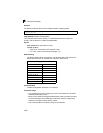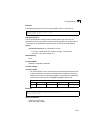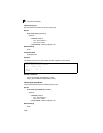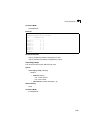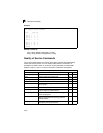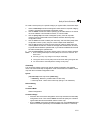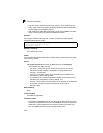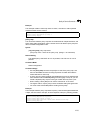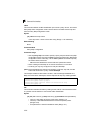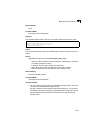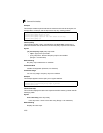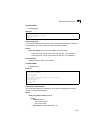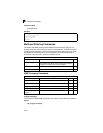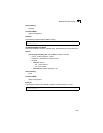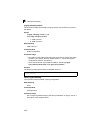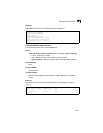
Command Line Interface
4-214
4
class
This command defines a traffic classification upon which a policy can act, and enters
Policy Map Class configuration mode. Use the no form to delete a class map and
return to Policy Map configuration mode.
Syntax
[no] class class-map-name
class-map-name - Name of the class map. (Range: 1-32 characters)
Default Setting
None
Command Mode
Policy Map Configuration
Command Usage
• Use the policy-map command to specify a policy map and enter Policy Map
configuration mode. Then use the class command to enter Policy Map Class
configuration mode. And finally, use the setand police commands to specify
the match criteria, where the:
- set command classifies the service that an IP packet will receive.
• When creating a Class Map do not use the character ‘&’ in the name.
• Currently you may only configure one rule per Class Map.
police command defines the maximum throughput, burst rate, drop rate, and the
action that results from a policy violation.Example
This example creates a class called “rd-class,” sets the average bandwidth the 1
Mbps, the burst rate to 1522 bytes, and the response to drop any violating packets.
set
This command classifies IP traffic by setting a CoS, DSCP, or IP Precedence value
in a packet. Use the no form to remove the traffic classification.
Syntax
[
no
]
set
{
cos
new-cos |
ip dscp
new-dscp |
ip precedence
new-precedence}
• new-cos - New Class of Service (CoS) value. (Range: 0-7)
• new-dscp - New Differentiated Service Code Point (DSCP) value.
(Range: 0-63)
• new-precedence - New IP Precedence value.
(Range: 0-7)
Console(config)#policy-map rd_policy
Console(config-pmap)#class rd_class
Console(config-pmap-c)#set ip dscp 3
Console(config-pmap-c)#police 100000 1522 exceed-action drop
Console(config-pmap-c)#



